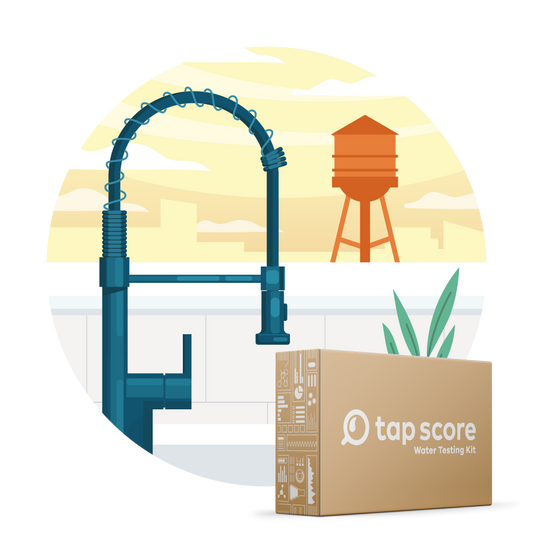
Quick Guide: Best Water Test Kits for New Homeowners
Our blog is written by real experts— not AI. Each guide is carefully reviewed and updated based on the latest research. Plus, with no affiliate links, you can count on unbiased insights you can trust.
Buying a new home comes with a host of often complicated tasks and requirements — including confirming your water supply is safe to drink. To ease at least one step in the process, we’ve prepared a quick guide to help new and prospective homeowners understand if they need to test their water and, if so, what to test it for.
Tap Score simplifies the water testing process by offering a wide range of kits linked to a nationwide network of certified laboratories; our helpful customer support team is there to guide you every step of the way.
Table of Contents:
- Which Contaminants Should I Test For?
- Does the Age of My House Matter?
- Home Loan Testing Requirements
- Home Loan-Approved Test Kits
- Homes with Private Wells
- Homes on City Water
- Can I Test By Myself?
Key Takeaways:
-
For properties with private wells, a water test kit for a property transfer should at least test for:
- Coliform bacteria
- Nitrates / nitrites
- Heavy metals
- Other contaminants of local concern
- Certain loans to finance or refinance a property require well water supplies to be tested. Make sure you find out whether specific contaminants need to be tested or specific procedures need to be followed
- Some circumstances require a third party to do the sampling; but the analysis of the water sample itself must be done by a certified lab. That means no DIY water testing strips
Which Water Contaminants Should I Test For?
When buying a new home, it’s important to get a complete picture of what might be in your water — not just the contaminants you’re required to test for.
Typically, you want to get to know key water chemistry parameters because they are important to understanding how your water might interact with your new home’s plumbing.
Additionally, you want to familiarize yourself with your new environment. What local contaminants might be of concern:
- Are you on a public water system or a private well?
- Are you near agriculture or heavy industry?
- Was the home constructed prior to 1988?
A comprehensive water kit for a new property will test for:
- Water chemistry parameters (pH, TDS, etc.)
- Heavy metals (lead, copper, iron, manganese, etc.)
- Disinfection byproducts (city water and private wells that chlorinate)
- Elements from aquifer material (arsenic, uranium, other radionuclides, etc., for private wells and city water sourced from groundwater)
- Coliform bacteria (private wells)
- Nitrate (private wells)
Do I Have to Test My Water Prior to a Property Transfer?
It is universally recommended to have well water tested during property transfers. Unlike public water systems, the federal government does not regulate water from private wells. And while environmental laws vary widely state by state, the majority of state governments do not regulate water from private wells, either.
Absent legal mandates, however, many states — e.g. Maine, Maryland, Pennsylvania, Vermont, Virginia, and Wisconsin — strongly encourage well water testing during property sales, and testing might even be required by specific mortgage lenders or as part of “due diligence” in the real estate transaction process.
The handful of states that have some form of testing requirement during property transfers are:
- Connecticut
- New Jersey
- Rhode Island
Some states (e.g., Massachusetts, Michigan, and New York) have select counties with local ordinances that require testing when properties are bought or sold.
It’s important to do your research by checking in with local health or environmental agencies to find out the testing particulars in your state. Realtors and lenders should be helpful on the subject as well, but not always.
via Unsplash
How Your Home's Age Affects Water Quality
Homes built before 1988 have a much higher chance of having lead in plumbing pipes and fixtures. Lead pipes, particularly the service lines connecting the home to the water main, were common throughout most of the 20th century.

In 1986, Congress amended the Safe Drinking Water Act, banning the use of lead pipes and plumbing materials in new home construction (some aspects of the ban were not enforced until 1988). However, many older homes still have lead service lines, and homes built before this date may contain lead faucets or plumbing fixtures. In some cases, lead-based materials were even found in homes built into the mid-1990s.
Because lead is a potent neurotoxin, lead exposure is particularly harmful to infants and young children, whose developing bodies are highly sensitive.
You may be able to determine if your new home has a lead service using techniques we discuss in the lead ultimate guide but there are no guarantees.
Testing your drinking water is the best way to assess your lead situation.
Are Lead Service Lines My Responsibility?
To a certain extent, they are. Take a look at the following graphic to better understand how public agencies claim responsibility for pipe networks.

Additionally, the specifics of service line replacement will depend on the utility involved.
What Are the Lead and Copper Rule Improvements (LCRI)?
Do FHA/VA/USDA Loans Require You to Test Your Water?
Yes — certain loans for financing or refinancing a property with a private well require water supplies to be tested under certain circumstances.
FHA (Federal Housing Authority) Loans
In order to qualify for an FHA loan, a property with a private well must have its water tested if the following circumstances apply:
- The well is newly constructed
- An appraiser has reported deficiencies with a well or its water
- The water supply has been reported to be unsafe or dangerous
- The property is located near a dump, landfill, industrial or agricultural site, or any other sites that could contain hazardous waste
- The distance between the well and the septic system is less than 100 feet
VA (Veterans Administration) Loans
VA loans require water tests any time a property with a private well is financed or refinanced. Other Requirements include:
- Testing must be done by a third-party (including sample collection and transportation)
- Water must meet requirements of local health authority
- If local guidelines have not been established, the well water will have to meet the EPA’s primary drinking water regulations
USDA (US Department of Agriculture) Loans
The USDA offers loans as part of a rural housing program in a designated eligible “Rural” area. These loans require:
- A local health authority or a state-certified laboratory perform the water quality analysis
- Well water quality meets the requirements of the state or local authority. If those guidelines have not been established, it must meet the EPA’s primary drinking water regulations
- The water analysis report must be no greater than 180 days old at loan closing
In all cases, your water must be tested by a third party — i.e., sent to a lab for testing or collected by an authorized individual and tested by a laboratory.
Do Home Inspectors Need a License to Test Water?
The short answer: it depends. Licensing and certification requirements for home inspectors vary from state to state. In some states, home inspectors must hold licenses similar to those required for other professions, while others may require specific certifications for certain types of sampling (e.g., asbestos testing). However, there’s no national standard or consistency in these regulations.
For the most accurate information, homeowners should check with their local state agency or lender. Additionally, the International Association of Certified Home Inspectors (NACHI) links to state-specific resources, which can help track down relevant requirements.
Need a Loan-Approved Test Kit?
Tap Score offers easy-to-use, fully compliant water testing kits, analyzed by certified labs so you can qualify for your loan without any hassle. All kits include step-by-step instructions, fast shipping, and accurate results you can trust.
Be sure to refer to your loan’s unique requirements to determine whether or not you need a third party to collect your sample.
What Should A Loan-Approved Water Test Kit Include?
For properties with private wells, a water test kit adequate to a property transfer should test for:
- Coliform bacteria
- Nitrates / nitrites
- Heavy metals (incl. Lead and arsenic)
- Other contaminants of local concern (particularly if specified in the loan application; examples incl. radionuclides or chemicals from local industry)
The Importance of Testing Private Well Water
Because neither the EPA nor local health agencies regulate or monitor private well water, water quality — and the maintenance necessary to ensure it remains safe to drink — is in your hands when you purchase a property with a private well.
Annual testing for bacteria and nitrate is a highly recommended practice for all private well owners. Additional testing is strongly encouraged by most state governments because groundwater can be exposed to a range of natural and human-made hazards including microbial contaminants, organic and inorganic compounds (e.g. pesticides, heavy metals), and radiological particles.
Some contaminants should be tested for more often than others, and we’ve prepared a handy Ultimate Guide to Well Maintenance, as well as the Ultimate Guide to Well Water Contaminants.
Do I Need to Test City Water?
Even if your property is on public utility water, it’s still a good idea to test your water. Public utilities generally do a great job making sure your tap water complies with regulations. But, some utilities have more resources than others, and water may travel through many miles of piping infrastructure to get from the treatment plant to your tap, all of which can affect the quality of water you drink.
Most importantly, as we covered above, the age of your house can help clue you in to some of the risks. For example, homes built before 1988 may still have pipes with high lead content; PVC pipes made before 1977 can leach vinyl chloride.
Where Can I Find the Latest Data from My Water Utility?
Every public water utility must report and make publicly available their cumulative water quality data for each year they are providing water. These reports are called Consumer Confidence Reports (or CCRs) and can usually generally be found by using a search for “CCR” or “water quality” on your utility’s website.
You can also use Tap Score’s City Water Project, which provides regional water quality information, to gain insight into geographical concerns around water quality. But it’s still no substitute to testing the water that flows out of your tap.
You don’t need to test for everything, but our Wirecutter-approved Advanced City kit covers the most important items:
Can I Test My Property’s Water Myself?
Tap Score’s mail-to-lab kits mean you can do your sampling yourself. Every kit comes with clear instructions to guide you every step of the way.
However, some home inspectors and specific loans might require an independent party to do the sampling. It’s important to find out the specifics before starting anything.
What it really comes down to is that the testing of the water sample itself is done in a certified laboratory and no place else.
Test strips, while easy to use and affordable, are not a reliable or accurate way to test your water for important contaminants; furthermore, they won’t cut it with any state, local, or lender requirements.










